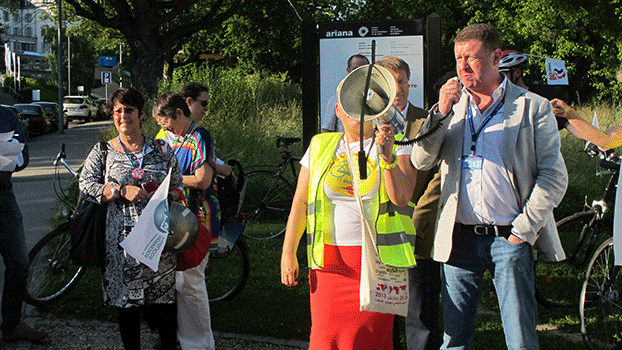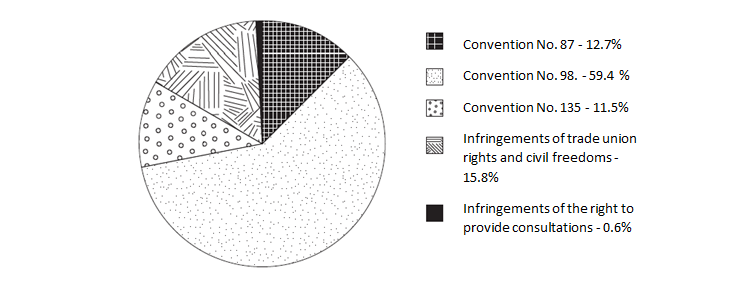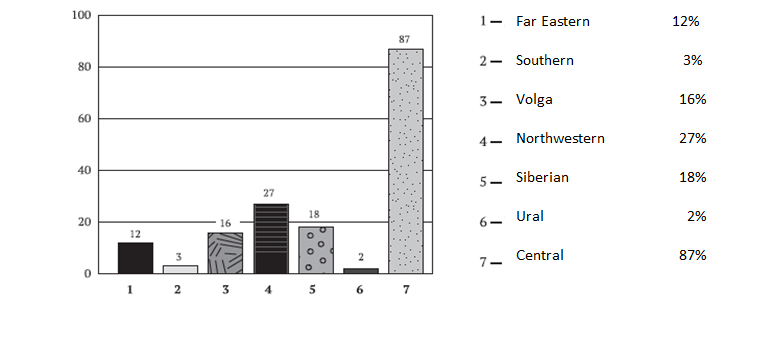
A recent report suggests that Russia still has a long way to go when it comes to ensuring trade unions’ place in society
In the mid-twentieth century freedom of association was internationally recognized as a basic human right and a fundamental principle of the International Labour Organization. In the modern world, workers’ rights to form trade unions and engage in collective bargaining are rarely challenged openly but often ignored in practice. As before, employees trying to exercise this right are likely to face government and employer pressure and legal obstacles.
Russia’s laws and constitution guarantee freedom of association, including the right to form trade unions for advancing workers’ interests and the freedom to set up and run non-governmental associations.
Russia ratified the ILO’s fundamental Conventions No. 87 and No. 98 concerning freedom of association and collective bargaining and the right of all workers and entrepreneurs to form and join organizations without previous authorization, thereby making a commitment to respect the said principles and rights.
Yet throughout modern Russian history trade unions have faced problems with carrying out their daily activities, since despite recognizing the rights stipulated in the ILO Conventions Russia has failed to provide adequate mechanisms supporting their implementation.
Unlike many European countries in which trade unions emerged and developed in a consistent manner over time, Russia’s trade union movement has an unusual history.
In the Soviet period, the government suppressed any attempts at worker solidarity actions or the creation of independent organizations. It was only at the turn of the 1980s and 1990s that Russia saw a revival of the labour movement and independent grassroots unions, marked by mass strikes, rallies, and speeches, which contributed greatly to the overall democratization of society.
In the post-Soviet era trade union roles and objectives went through a major revision, but are still the most numerous of nongovernmental entities in Russia. A particularly good example is the Russian Confederation of Labour, (KTR), a national association established in 1995, which brought together the country’s independent unions. KTR’s membership includes more than 20 national and interregional trade unions.
Like other nongovernmental organizations in Russia, independent unions face difficulties such as undue employer and state interference in union activity, barriers to collective bargaining, discrimination against union members, limited opportunities to set up and register new organizations, disproportionate restrictions on the right to strike, and sometimes pressure, persecution, criminal charges, and violent attacks against trade unionists.
General Overview of Freedom of Association in Russia, 2015–2018
In what follows we present a compilation of data illustrating the practical application of the principles of freedom of association in Russia from 1 January 2015 through 31 March 2018. The information collected over the course of monitoring infringements against trade union rights and freedom of association has been compiled and analysed by the Centre for Social and Labour Rights, an independent non-profit organisation, and by the Confederation of Labour of Russia, a nationwide Russian trade union association.
Instances of infringement were recorded by trade union associations that are members of the Confederation of Labour of Russia and subsequently categorized under uniform descriptive categories and codified for the purpose of the following analysis.
Information on165 instances of infringement of trade union rights was analysed over the duration of the monitoring
All of this information on infringements was systematically classified (based on provisions of the fundamental ILO Conventions) into five basic categories:
- Infringements of trade union rights and civil freedoms;
- Infringements of the ILO Convention concerning Freedom of Association and the Right to Organize, 1948 (No. 87);
- Infringements of the ILO Convention concerning the Application of the Principles of the Right to Organize and to Bargain Collectively, 1949 (No. 98);
- Infringements of the ILO Convention concerning Protection and Facilities to be Afforded to Workers’ Representatives in the Undertaking, 1971 (No. 135);
- Infringements of the right to provide consultations.
Each of the categories listed incorporates specific types of infringement, and in any particular case there may be several infringements affecting the various rights and guarantees stipulated by the Conventions.
To date, trade union associations have gathered information on infringements that fit into each of the five categories listed above. This outcome testifies to the fact that despite official declarations of the importance of the rights stipulated in these Conventions, problems in ensuring the exercise or those rights have not been resolved in practice.
Trade union organizations have provided information testifying to the existence of an extremely broad spectrum of problems with exercising their right to freedom of association.
Trade unions also face obstacles to their everyday operations. There are problems with restrictions in creating and registering organizations; interference by employers and others in trade union activities; restrictions on conducting collective bargaining; discrimination against trade union members; and unreasonable limitations on the right to strike.
As one way of characterizing the overall situation, there are reports of serious pressure and persecution including even imprisonment and physical violence against trade union activists along with attempts to dissolve trade unions.
Over the last three years trade unions have provided:
- 21 reports related to Convention No. 87;
- 98 reports related to Convention No. 98;
- 19 reports related to Convention No. 135;
- 26 reports of infringements of trade union rights and civil freedoms;
- 1 report of an infringement of the right to provide consultations.
The proportions (by percentage) of reported infringements against trade union rights and civil liberties arranged according to the groups of rights and freedoms are shown below in Figure 1.

As Figure 1 clearly shows, the most common infringements relate to ILO Convention No. 98, which primarily concerns discrimination against trade unions. During the monitoring information 20 such instances came to light in which there were firings of trade union activists, illegal transfer to other jobs and layoffs, imposition of disciplinary fines and partial withholding of wages, pressuring trade union members, and other forms of discrimination. These instances are typically actions taken by employers against trade union officers and members either for starting up a trade union, for being a member, or for involvement in trade union activities. Such instances of interference with the activities of trade unions constitute about one third of all reports.
These infringements must be closely watched, as it is particularly important that trade unions and employer associations function in complete independence and freedom in order to exercise the principle of freedom of association.
This suggests that two forms of interference must be eliminated: first, interference in the operations of these organizations on the part of government agencies; second, interference by employer organizations in the creation and functioning of workers’ organizations. The prevalence of these instances indicates a need to take steps that would promptly and effectively discourage their recurrence.
In addition, there are frequent references to infringements of the right to collective bargaining as envisaged in Convention No. 98. An unequivocal acknowledgement of the right of trade unions to conduct collective bargaining is the main instrument for exercising the right to freedom of association. Collective bargaining is one of the ways to achieve solutions acceptable to both sides in potential conflicts between workers and employers.
Acknowledgement of the right to collectively bargain is crucial to the representation of collective interests. That right is built on the principle of freedom of association and gives real meaning to collective representation. However, as is clear from the reports received, in practice trade unions are deprived of this fundamental right; in extreme cases trade union activists may be subjected to threats and criminal prosecution for exercising that right.
Infringements against trade union rights and civil freedoms are the second most frequently encountered category. These infringements involve actions of law enforcement agencies, particularly court judgments against trade union leaders and arrests of trade union activists; infringements against the right to safety and physical security for trade union members. Accounting for these infringements is particularly important because in exercising the principle of freedom of association and the right to collective bargaining a great deal hinges on observance of fundamental civil freedoms including the right to personal freedom and security, freedom of conviction and speech, freedom of assembly, the right to a fair and impartial hearing before an independent judiciary, and protection of trade union property. The information available indicates that at present various forms of serious infringement against civil rights and freedoms are taking place.
The second-most common category of infringements by frequency concerns infringements against ILO Convention No. 87. There were infringements of the right to freely form trade unions and enrol in them as stipulated in their charters, of the right of trade unions to freely organize their activities and establish a programme for action, and of the right to strike. Clearly, these infringements are equally detrimental and require external application of protection against interference with trade union activities.
Infringements against the provisions of ILO Convention No. 135 were reported including refusal of employers to provide a space for holding trade union meetings or a place for posting trade union informational materials. Trade union representatives were barred from workplaces (for example by revoking the permit to enter the premises of an enterprise), and collection of trade union dues was hindered along with other infringements.
Infringements against the right to consultation occurred in connection with an employer’s refusal to consult with a trade union during staff cutbacks. Although this kind of infringement is not frequent, it demands attention and a solution just as much as the others.
It should be noted that more than half of the recorded infringements were systematic in nature.
The next important aspect of the monitoring is analysis of the geographic distribution of infringements. To date, information on infringements has come in from all districts in the Russian Federation with the exception of the North Caucasus Federal District:
Far Eastern Federal District | 12 | |
| Primorsky Krai | 7 |
| Republic of Sakha (Yakutia) | 1 |
| Sakhalin Oblast | 1 |
| Khabarovsk Krai | 3 |
Southern Federal District | 3 | |
| Krasnodar Krai | 2 |
| Republic of Crimea | 1 |
Volga Federal District | 16 | |
| Nizhny Novgorod Oblast | 2 |
| Perm Krai | 2 |
| Republic of Bashkortostan | 1 |
| Samara Oblast | 8 |
| Udmurtia Republic | 2 |
| Ulyanovsk Oblast | 1 |
Northwestern Federal District | 27 | |
| Arkhangelsk Oblast | 2 |
| Vologda Oblast | 2 |
| Leningrad Oblast | 3 |
| Novgorod Oblast | 1 |
| Saint Petersburg | 19 |
Siberian Federal District | 18 | |
| Altai Krai | 2 |
| Irkutsk Oblast | 2 |
| Krasnoyarsk Krai | 1 |
| Omsk Oblast | 13 |
Ural Federal District | 2 | |
| Sverdlovsk Oblast | 1 |
| Khanty-Mansi Autonomous Okrug—Yugra | 1 |
Central Federal District | 87 | |
| Bryansk Oblast | 4 |
| Vladimir Oblast | 2 |
| City of Moscow | 39 |
| Kaluga Oblast | 33 |
| Moscow Oblast | 7 |
| Oryol Oblast | 1 |
| Tver Oblast | 1 |
|
|
|
The Central Federal District outstrips the others in the number of reported infringements (Figure 2).

The monitoring also analysed information on the outcomes of infringements, specifically whether infringement of rights had ceased and whether trade union members continued working for a particular employer.
During the monitoring period most infringements did not cease. In a number of instances this was because the trade union or representatives had not turned to authorities to correct the situation. In other cases turning to the authorities had been futile, as when turning to the State Labour Inspectorate had no effect on resolving the situation.
Infringements of rights were stopped completely only in 24 of the 165 instances. That figure indicates that the capacity to effectively settle labour conflicts arising from infringements against the principle of freedom of association is inadequate and that these infringements in turn may lead to further opposition instead of contributing to an environment of social dialogue and negotiations.
The purpose of the monitoring is to collect, compile, and analyse information about obstacles and infringements that trade union organizations encounter as they go about their work. The long-term goal of these efforts is to change attitudes toward problems in applying the principles of freedom of association to labour relations and toward violations of those principles, and also to have all participants in Russia’s social dialogue reconsider the approaches available for resolving problems in the exercise of trade union rights.
Julia Ostrovskaya is a lawyer and holds a Master’s degree in political science. She is currently a PhD student in the Department of Theory and History of State and Law at the National Research University Higher School of Economics in Moscow. She is also the Deputy Director of the Centre for Social and Labour Rights (CSLR), a Russian non-profit NGO for promotion, compliance, and protection of social and labour rights. CSLR cooperates with Russian and international trade unions, NGOs, government agencies, and expert communities.